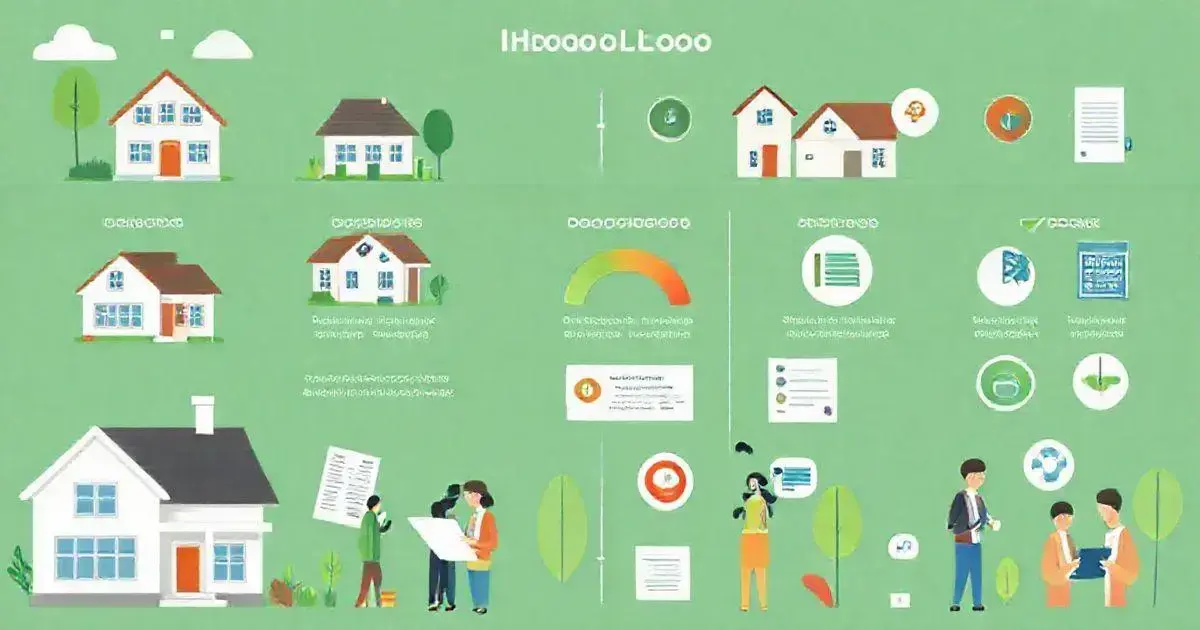Understanding Credit Scores
Understanding credit score requirements for home loans is essential for anyone looking to secure a home loan. A credit score is a three-digit number that lenders use to assess your creditworthiness. Typically, this score ranges from 300 to 850. The higher your score, the better your chances of getting approved for a loan with favorable terms.
Credit scores are calculated based on various factors, including your payment history, the amount of debt you owe, the length of your credit history, new credit inquiries, and the types of credit in use. Payment history is the most significant factor, making it crucial to pay your bills on time. Late payments can significantly lower your score.
Understanding credit score requirements for home loans also involves knowing what is considered a good credit score. Generally, a score of 700 or higher is favorable for lenders, while scores below 620 may hinder your ability to secure a loan.
Additionally, it’s essential to check your credit report regularly. Errors can occur, and fixing them could boost your score. Free annual credit reports are available that allow you to monitor your financial standing. By being informed and proactive, you can improve your credit score and increase your chances of securing a home loan.
Importance of Your Credit Score

The importance of your credit score requirements for home loans cannot be overstated when applying for a home loan. Lenders use your credit score to evaluate your likelihood of repaying the loan. A higher credit score typically means better loan terms, such as lower interest rates and fewer fees. Understanding how your score can impact your loan options is crucial.
Your credit score is influenced by several factors. These include your payment history, debt-to-income ratio, and the length of your credit history. Payment history is particularly significant; making timely payments can enhance your score. Conversely, missing payments can have a detrimental effect.
In addition, the amount of debt you carry relative to your available credit also plays a role. It’s best to keep your utilization ratio below 30%. This means if you have a credit limit of $10,000, try not to use more than $3,000 at any given time.
Knowing the importance of maintaining a good credit score requirements for home loans can help you plan effectively when seeking a mortgage. Many experts recommend checking your credit score regularly to track your progress and to identify any areas for improvement before applying for a loan.
By understanding your score and its implications, you can better position yourself for a successful home loan application.
Minimum Credit Score Requirements
The minimum credit score requirements for home loans vary by lender and loan type. Typically, a score of 620 or higher is necessary for conventional loans. If your score is below this threshold, you might face higher interest rates or even be denied a loan altogether.
For FHA loans, which are popular among first-time homebuyers, the requirements are generally more lenient. You can qualify with a credit score as low as 580 if you’re making a 3.5% down payment. If your score is between 500 and 579, a 10% down payment is needed.
VA loans, backed by the Department of Veterans Affairs, do not have a strict minimum credit score requirement. However, most lenders prefer scores of 620 or above.
Understanding these minimum requirements is essential. A higher score not only improves your chances of getting approved but can also reduce your overall borrowing costs. Therefore, if your score needs improvement, consider strategies like paying down debt or ensuring timely payments to boost your score.
How to Improve Your Credit Score

Impact of Credit History on Home Loans
The impact of credit history on home loans plays a significant role in the lending process. Lenders rely on your credit history to determine your ability to manage debt responsibly. A positive credit history demonstrates your reliability as a borrower, which can lead to better loan options and lower interest rates.
Your credit history includes a record of your repayment habits, types of credit accounts, and the duration of your credit relationships. If you have a history of missed payments or high credit balances, it could negatively affect your chances of securing a loan.
Additionally, having a diverse credit mix can be beneficial. Lenders prefer to see that you can handle various types of credit, such as credit cards, installment loans, and mortgages. This variety can show your ability to manage different debts.
It’s also important to note that a longer credit history can increase your score. This means that maintaining older accounts can be a strategic move for improving your creditworthiness.
Understanding the impact of your credit score requirements for home loans history can help you prepare for applying for a home loan. By actively managing your accounts and ensuring timely payments, you can establish a strong credit history that works in your favor.
Types of Home Loans and Credit Score Needs

When it comes to types of home loans and credit score needs, different loans have different requirements.
For conventional loans, most lenders look for a credit score of at least 620. This score reflects your ability to manage debt responsibly and gives lenders confidence in your repayment capability.
On the other hand, FHA loans are more forgiving. They allow scores as low as 580 when making a 3.5% down payment. If your score is between 500 and 579, you may still qualify with a 10% down payment.
VA loans, available to veterans and active military personnel, may not have strict minimum credit score requirements, but a score of 620 is typically preferred. These loans can offer lower interest rates and no down payment, making them an attractive option for eligible borrowers.
Understanding which loan type suits your credit score can help you make informed financial decisions. Always check specifics with lenders to see what scores they accept for the home loan you desire.
Common Myths About Credit Scores
Checking Your Credit Score for Free

Steps to Take if You Don’t Meet Requirements
If you find that you don’t meet the credit score requirements for home loans, there are several steps you can take to improve your situation. First, review your credit report to identify any errors that may be dragging down your score. Disputing these inaccuracies can lead to an increase in your overall score.
Next, focus on paying down existing debt. Reducing your credit utilization ratio can have a positive impact. Try to keep your utilization below 30% of your total available credit.
You should also consider making all future payments on time. Setting up automatic payments can help you avoid missing due dates on your bills.
If your score is still not where you want it to be, consider applying for a secured credit card. This type of card allows you to build credit by making small purchases and paying them off each month.
Finally, you might want to explore credit counseling services. These organizations can provide valuable guidance and support to help you improve your financial situation. By taking these steps, you can work towards qualifying for a home loan in the future, ensuring that you meet the credit score requirements for home loans.
In Conclusion
FAQ – Frequently Asked Questions about Credit Scores and Home Loans
What is a credit score?
A credit score is a three-digit number that represents your creditworthiness to lenders.
What is considered a good credit score for a home loan?
Generally, a good credit score for a home loan is 700 or above, but some loans may allow for lower scores.
How can I check my credit score for free?
You can check your credit score for free through services like Credit Karma or by visiting AnnualCreditReport.com.
What factors affect my credit score?
Factors include payment history, credit utilization, length of credit history, types of credit used, and recent credit inquiries.
How long does it take to improve my credit score?
Improving your credit score can take several months, depending on your current situation and the steps you take.
What should I do if I don’t meet the credit score requirements for a loan?
Consider reviewing your credit report for errors, paying down debt, and improving payment habits to boost your score.

